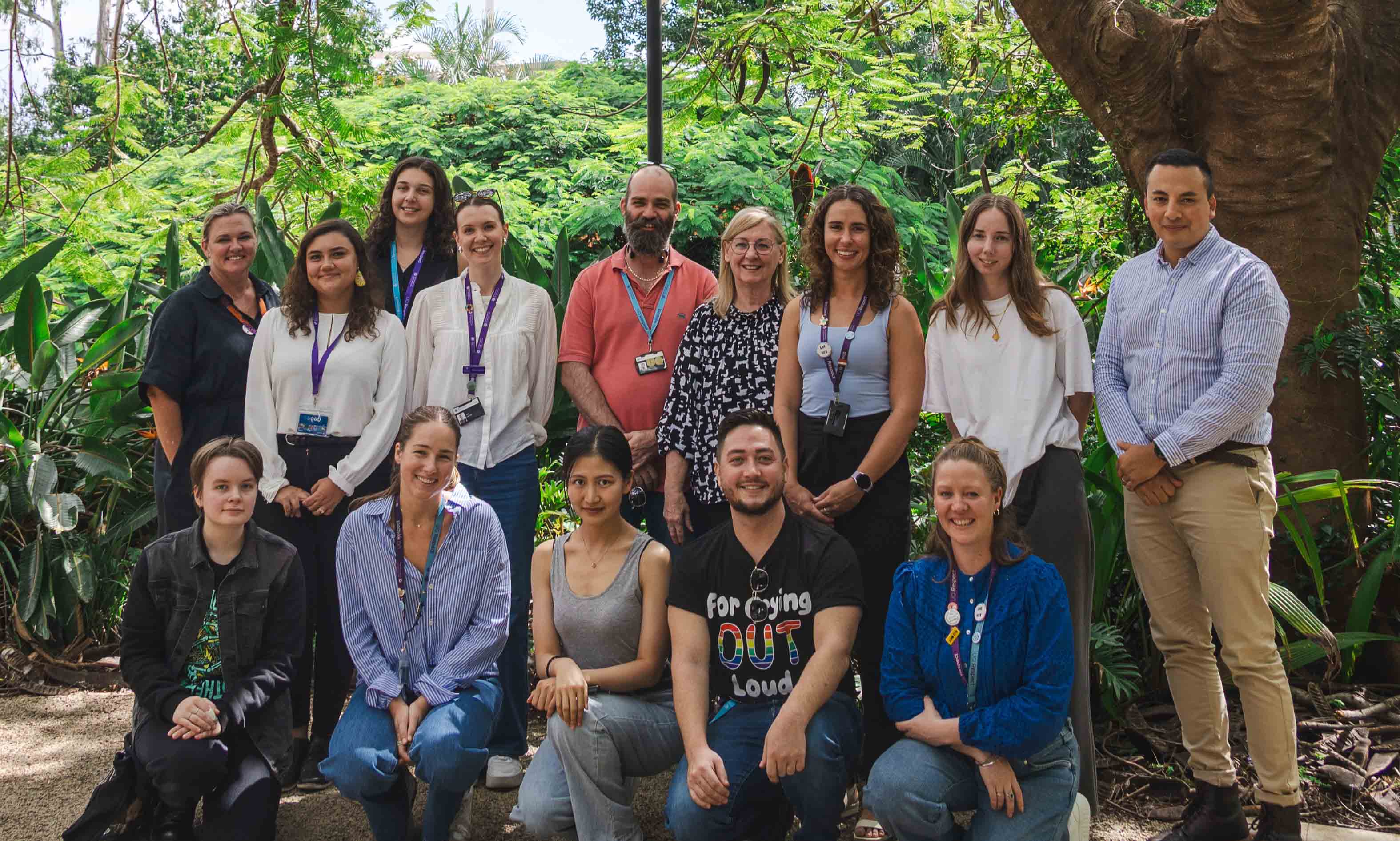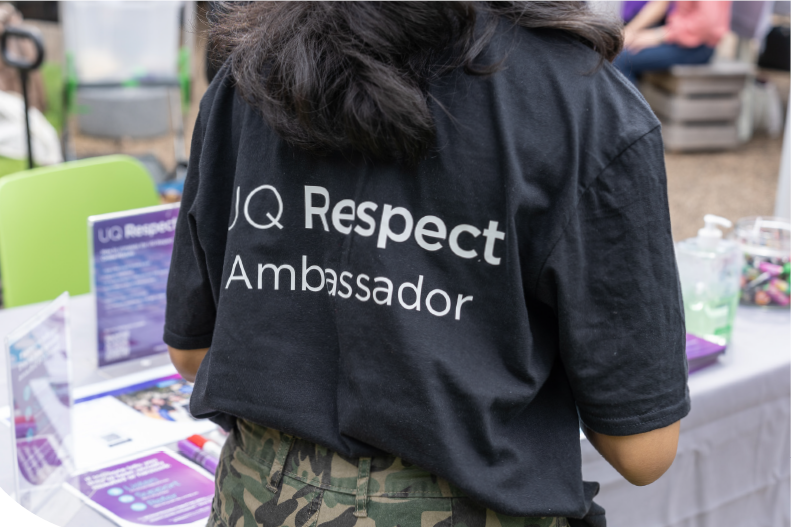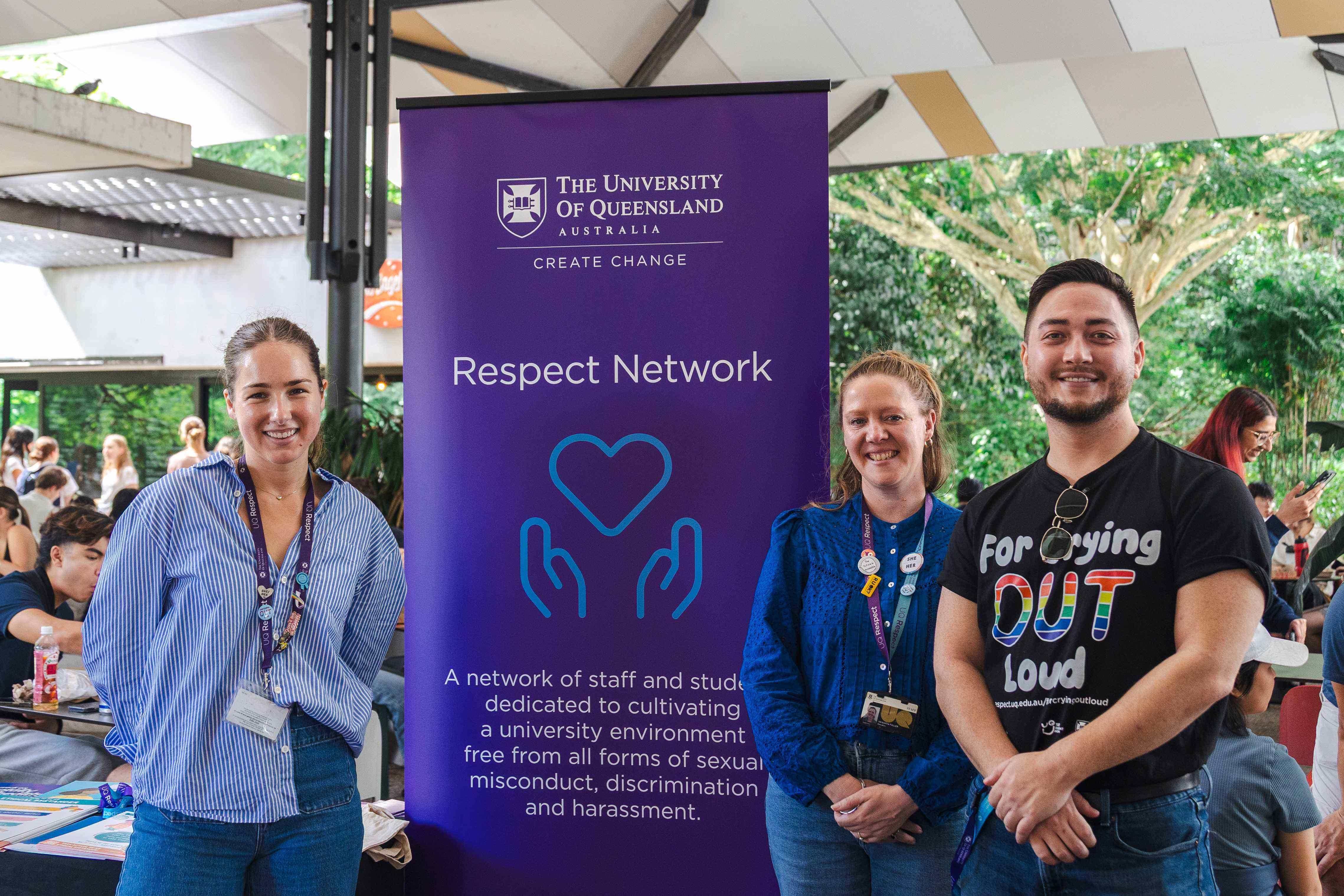Respect Network

The Respect Network is a network of staff and students at UQ dedicated to cultivating a university environment free from all forms of sexual misconduct, discrimination and harassment.
The Respect Network was launched in March 2025 to give passionate UQ staff and students the opportunity to learn more about, contribute to, and engage in prevention initiatives in their areas of the university.
What is the Respect Network
Respect Network Ambassadors are UQ staff and students who promote a safe, respectful, inclusive, and violence-free culture at UQ by working alongside UQ Respect and Workplace, Diversity and Inclusion. Respect Network Ambassadors play an active role in the prevention of violence, harassment and discrimination by:
Attending learning and professional development opportunities organised by the Respect Network
Promoting key campaigns, resources and services from UQ Respect and Workplace Diversity and Inclusion within their networks
Volunteering at Respect Network events to help the network reach a wider audience
Using their voice to influence key prevention initiatives at UQ
Respect Network Ambassadors are not expected to be specialists in the prevention and response to sexual misconduct, discrimination and/or harassment. Instead, Respect Network Ambassadors represent UQ community members who believe that sexual violence, discrimination and harassment have no place in the UQ community and want to do something about it. Creating culture change requires us all to understand the roles we can each play in our day-to-day lives to create safer communities, whether we're studying, working or connecting at UQ.
Aims and objectives
The Respect Network aims to:
Cultivate a university environment/s free from all forms of sexual misconduct, discrimination and harassment
Identify and address barriers faced by students and staff in accessing information, support and reporting in relation to sexual misconduct, harassment and discrimination
Drive collaboration and consultation to ensure all university initiatives are designed with key, relevant populations in mind
Create a vast community network of staff and students engaged in continuous learning to ensure up-to-date knowledge and approaches to prevention
Listen, Support, Refer
All members of the network are equipped through training to safely and appropriately respond to disclosures of sexual violence and harassment. Please note that members of the Respect Network are not counsellors and cannot provide counselling support. Respect Network members are there to provide support and information to the UQ community by utilising UQ’s Listen, Support, Refer model. This model is applicable to people of all knowledge and skill levels to understand their roles and boundaries when receiving a disclosure to enable safe, trauma-informed and survivor-centred practice.
For counselling support, support making a report, academic adjustments, accommodation or financial support, along with other forms of support, please contact UQ Safer Communities.
Further information
You can download the Respect Network Member Handbook here for further information about how you can be an active member in preventing gender-based violence.
If you have any questions about the Respect Network, please contact us at uqrespect@uq.edu.au.
Joining the Respect Network
Volunteer with us (and learn with us)!
All Respect Network members must complete training to join the program. The network aims to engage staff and students from across all schools, faculties, institutions, student societies, residential colleges and organisational units across UQ.
Student Information Session
To become a Respect Network member, register your interest through our Expression of Interest (EOI) form and attend an information session. To join:
- Sign up to an information session via StudentHub:
- Thursday 12 March, 9:30am-11:30am. Register here: Joining the Respect Network: Student Session
- After attending this information session, you will be asked if you would like to officially join the Respect Network.

Joining the Respect Network
Volunteer with us (and learn with us)!
All Respect Network members must complete training to join the program. The network aims to engage staff and students from across all schools, faculties, institutions, student societies, residential colleges and organisational units across UQ.
Staff/HDR Candidate Training
To become a Respect Network member, register for training via Workday to register your interest. To join:
- Sign up and attend the Respect Network Workshop 1: Prevention in Action workshop. Here, the UQ Respect team will introduce you to the program and teach you about prevention, its importance and how to enact it within your work spaces.
Sign up and attend the Respect Network Workshop 2: Responding to Gender-Based Violence training to learn more about how to safely respond to disclosures of violence, harassment and discrimination.
After completing the second session, you will be asked if you would like to officially join the Respect Network.

Connecting with Respect Network members
The Respect Network are a collective of students and staff across our university campuses dedicated to the prevention of sexual and gender-based violence, discrimination and harassment.
The Respect Network exists to connect, empower, and upskill our UQ community to promote safe, respectful, inclusive, and violence-free cultures at UQ.
While all members of the network receive training on how to safely and appropriately respond to disclosures of sexual violence and harassment, Respect Network Ambassadors are not qualified first responders or counsellors who can provide support. Rather, Respect Network Ambassadors receive fundamental information about responding to disclosures to ensure they can be safe spaces for anyone who may choose to talk with them about their experiences.
Respect Network Ambassadors are trained to respond by utilising UQ’s Listen, Support, Refer model which focusses on providing victim-survivors options for support in a safe, trauma-informed and survivor-centred way. UQ has a variety of supports for staff and students in relation to experiences of sexual and gender-based violence which can be found in 'Getting Support' below.
Contacting the Respect Network
The Respect Network is coordinated by the UQ Respect team.
If you have any questions about the Respect Network, please contact the UQ Respect team at uqrespect@uq.edu.au.
Getting Support
Students
Sexual Misconduct Support Unit (SMSU)
UQ's SMSU is a safe and supportive place for the UQ community to receive free, confidential guidance and support around sexual assault and sexual harassment. The SMSU can also provide support and information to people experiencing domestic andfamily violence.
You can contact the SMSU by:
- booking an appointment online on StudentHub,
- calling our support line +61 7 3443 1000 (open Monday to Friday, 8am to 5pm),
- emailing sexualmisconductsupport@uq.edu.au, or
- submitting a confidential disclosure online.
Staff
Employee Assistance Program (EAP)
UQ staff and their immediate family members can access a free and confidential wellbeing, coaching and counselling service through the EAP. The program is provided by PeopleSense, UQ's wellbeing and employee assistance provider, through qualified practitioners.
To access the EAP:
- call 1300 307 912 to make an appointment
If you are calling due to an urgent crisis and you have concerns for the welfare of yourself or a family member, tell the booking service and they can connect you with a crisis professional. Confidential phone counselling, manager assist and critical incident services are available 24/7.
For counselling support, support making a report, academic adjustments, accommodation or financial support, along with other forms of support, please contact the Sexual Misconduct Support Unit (SMSU).

